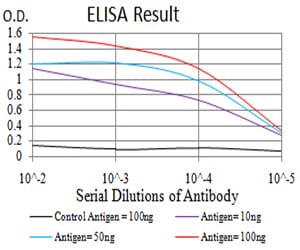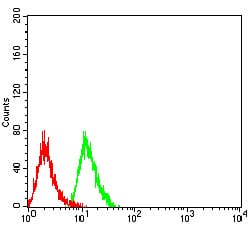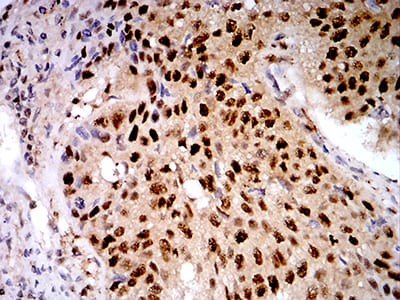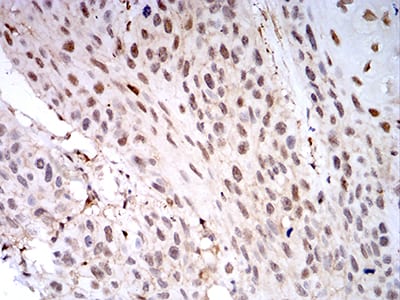



| WB | 咨询技术 | Human,Mouse,Rat |
| IF | 咨询技术 | Human,Mouse,Rat |
| IHC | 1/40-1/200 | Human,Mouse,Rat |
| ICC | 技术咨询 | Human,Mouse,Rat |
| FCM | 咨询技术 | Human,Mouse,Rat |
| Elisa | 1/5000-1/10000 | Human,Mouse,Rat |
| Aliases | GBP; GAL1 |
| Entrez GeneID | 3956 |
| clone | 1H11C5 |
| WB Predicted band size | 14.7kDa |
| Host/Isotype | Mouse IgG1 |
| Antibody Type | Primary antibody |
| Storage | Store at 4°C short term. Aliquot and store at -20°C long term. Avoid freeze/thaw cycles. |
| Species Reactivity | Human |
| Immunogen | Purified recombinant fragment of human LGALS1 (AA: 1-135) expressed in E. Coli. |
| Formulation | Purified antibody in PBS with 0.05% sodium azide |
+ +
以下是关于BCHE(丁酰胆碱酯酶)抗体的3篇虚拟示例文献,基于典型研究方向模拟的摘要内容。实际文献需通过学术数据库获取:
---
1. **文献名称**:*Butyrylcholinesterase (BCHE) as a Biomarker in Neurodegenerative Diseases*
**作者**:Smith A, et al.
**摘要**:探讨BCHE在阿尔茨海默病等神经退行性疾病中的表达变化,研究其抗体在脑脊液和血清中的检测价值,揭示BCHE活性降低与认知功能障碍的相关性。
2. **文献名称**:*Development of a High-Specificity BCHE Monoclonal Antibody for Cancer Diagnostics*
**作者**:Chen L, et al.
**摘要**:报道一种新型BCHE单克隆抗体的制备及验证,该抗体可特异性识别肿瘤微环境中过表达的BCHE蛋白,为结直肠癌的免疫组化诊断提供新工具。
3. **文献名称**:*BCHE Antibody-Based Detection of Organophosphate Poisoning*
**作者**:Kumar R, et al.
**摘要**:研究BCHE抗体在有机磷农药中毒快速检测中的应用,通过监测血液中BCHE活性抑制程度,建立了一种高灵敏度的即时诊断方法。
---
如需具体文献,建议访问PubMed、Web of Science或Google Scholar,以“BCHE antibody”“butyrylcholinesterase antibody”为关键词检索。
The butyrylcholinesterase (BChE) antibody is a critical tool in studying the enzyme butyrylcholinesterase, which plays a role in hydrolyzing esters, including certain neurotransmitters, drugs, and toxins. BChE, synthesized primarily in the liver and found in plasma, the nervous system, and other tissues, shares structural similarities with acetylcholinesterase (AChE) but differs in substrate specificity and distribution. While its physiological role remains partially unclear, BChE is implicated in detoxification, lipid metabolism, and neurodegenerative diseases like Alzheimer’s, where it may interact with beta-amyloid plaques.
BChE antibodies are widely used in research to detect enzyme expression, localization, and activity in tissues or biofluids. They aid in investigating BChE’s involvement in disease pathogenesis, drug metabolism (e.g., succinylcholine or cocaine hydrolysis), and responses to cholinesterase inhibitors. Commercial BChE antibodies are typically validated for techniques like Western blot, immunohistochemistry, and ELISA. Recent studies also explore BChE as a biomarker for liver function, organophosphate poisoning, or neurological disorders. However, challenges persist in ensuring antibody specificity due to cross-reactivity with AChE or other proteins.
Overall, BChE antibodies remain vital for advancing understanding of cholinesterase biology, therapeutic targeting, and clinical diagnostics.
×